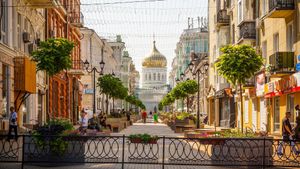Delhi has been gripped by severe air pollution once again, necessitating the reimposition of stringent measures meant to combat the deteriorated air quality levels. On December 17, 2024, the Commission for Air Quality Management (CAQM) invoked Stage-IV restrictions under the Graded Response Action Plan (GRAP), marking the fourth emergency stage to curb the toxic haze enveloping the region. This decisive step was triggered after the Air Quality Index (AQI) breached the alarming 400-mark, indicating hazardous pollution levels.
According to reports from Times of India, the city's air quality dipped to the 'severe' category, with several areas showing AQI levels above 400. Notable hotspots for pollution included Jahangirpuri, Anand Vihar, and Bawana, where AQI readings hit staggering figures, such as 466. The city's 37 air quality monitoring stations collectively revealed 26 areas classified under severe conditions, highlighting the gravity of the situation.
Contributing to this crisis, stagnant weather conditions and the formation of temperature inversion layers have resulted in the accumulation of pollutants. With calm winds prevailing over the city, hazardous particles have become trapped close to the ground, raising serious public health concerns.
To alleviate the impact on daily life, Stage-IV GRAP measures include sweeping bans on all non-essential construction activities, significantly limiting vehicular access to the city. Specifically, the entry of non-essential trucks has been curtailed, with exceptions made only for those carrying essentials or running on cleaner fuels such as LNG or CNG. Heavy Goods Vehicles (HGVs) and Light Commercial Vehicles (LCVs) not adhering to BS-VI emissions standards are also restricted from entering Delhi.
Schools and educational institutions have been similarly affected, with the CAQM mandatorily shifting classes to hybrid formats for students ranging from grades VI to IX, as well as XI, across the National Capital Region (NCR). Classes up to grade V also transitioned to online learning due to the unsafe air quality, making education increasingly reliant on digital formats.
Pritika Gupta, principal of the Sovereign School, noted the need for adaptability stating, “We are conducting online classes for students up to Class 5, as many parents have requested this change.” Meanwhile, schools preparing for exams have been faced with dilemmas over how best to serve their students amid the crisis.
Health experts continue to raise alarms over the prolonged exposure to this toxic air. Research has indicated the staggering truth: breathing Delhi's polluted air may be akin to smoking approximately 10 cigarettes each day. Vulnerable populations, including children, the elderly, and individuals with pre-existing health conditions, have been especially cautioned to limit outdoor activities and where possible, stay indoors.
The Indian Meteorological Department (IMD) has predicted conditions, such as high humidity and dense fog, will only exacerbate pollution levels, with calm winds anticipated to persist. This continued stagnation of air means pollutants will remain trapped, worsening the already precarious health situation for Delhi's inhabitants.
Indeed, this isn’t the first time Delhi has faced such dire circumstances, with the Supreme Court previously declaring the right to breathe clean air as fundamental. Political and public pressure mounts for long-term solutions to eradicate the seasonal smog, linked to vehicle emissions, stubble burning, and general urban pollution over the winter months.
While the recent GRAP Stage-IV initiation reflects just one aspect of Delhi's fight against air pollution, its successful implementation requires rigorous enforcement. Authorities are urged not only to impose these measures but also to see through their effectiveness. Residents have been encouraged to utilize N95 masks, use air purifiers at home, and keep outdoor exposure as limited as possible.
With the city's desire for clean air heavily overshadowed by its current state of emergency, the utilitarian measures imposed by GRAP seem as much about survival as they are about environmental reform. The question remains: will the measures be effective enough, or will the residents of Delhi continue to choke on this toxic cocktail of pollution, even as officials strive to fight back against their soupy atmosphere?



